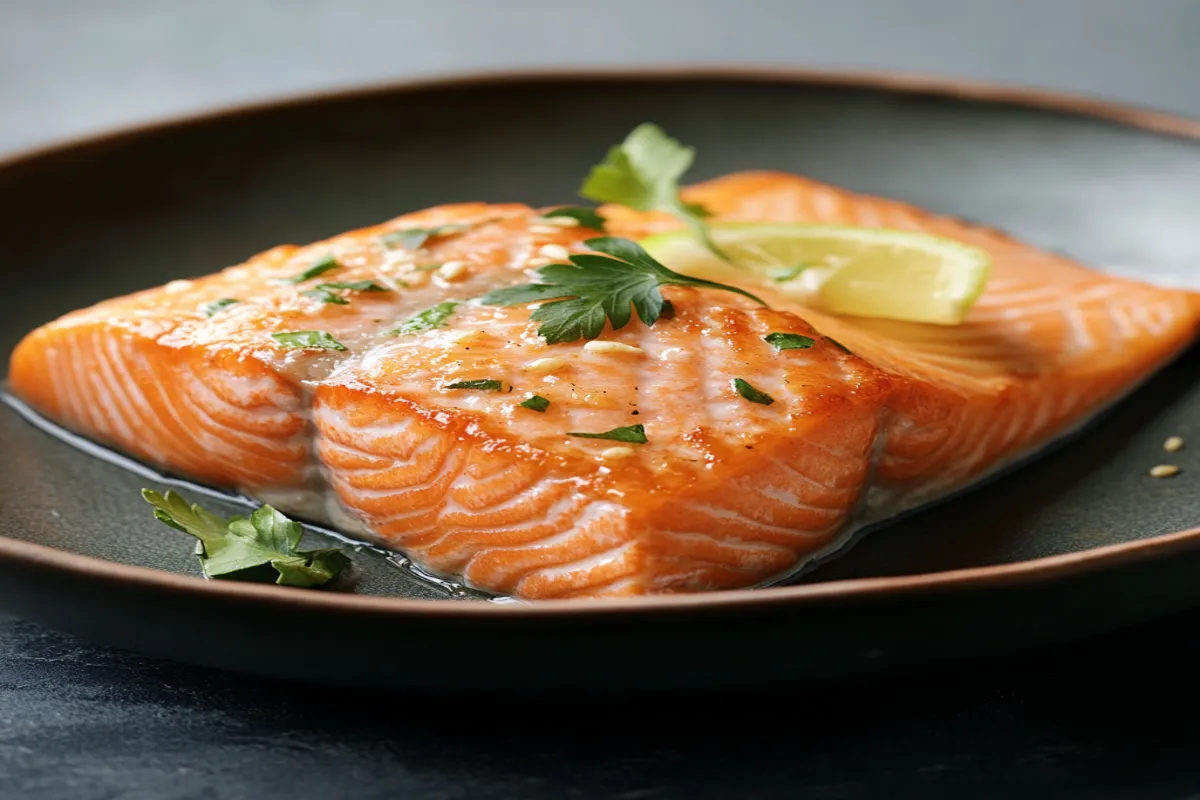When it comes to consuming leftovers, food safety is a primary concern, especially with perishable items like cooked salmon. Many people wonder, “Can you eat salmon 5 days after cooking?” In this comprehensive guide, we’ll explore how long cooked salmon can last, the potential risks of eating it after five days, best practices for storage and consumption, and creative ways to make use of leftovers. By the end, you’ll have a clear understanding of whether it’s safe to consume salmon five days after cooking and how to ensure it remains safe and delicious.
How Long Does Cooked Salmon Last? Can You Eat Salmon 5 Days After Cooking?
According to food safety guidelines, you should store cooked salmon in the refrigerator for 3-4 days. So, can you eat salmon 5 days after cooking? The answer depends on several factors, including how you stored the salmon and the conditions it was exposed to. After four days, the quality of the fish starts to deteriorate, and the risk of harmful bacterial growth increases. Thus, it’s crucial to store the fish in an airtight container and refrigerate it promptly to extend its freshness.
Factors Affecting Shelf Life of Cooked Salmon
The longevity of your cooked salmon depends on several factors:
- Temperature: Salmon should be stored in the refrigerator at or below 40°F (4°C). Higher temperatures accelerate bacterial growth, reducing the safe storage period.
- Storage Method: Always store cooked salmon in an airtight container to prevent contamination and moisture loss. Exposure to air leads to spoilage more quickly.
- Initial Freshness: The freshness of the salmon before cooking impacts its post-cooking shelf life. Fresh salmon, cooked promptly, lasts longer than salmon close to its expiration date before cooking.
- Handling: Proper handling, including washing hands and utensils before and after touching the salmon, prevents contamination.
For more detailed information on the shelf life of salmon in the fridge, refer to the article on how long cooked salmon lasts in the fridge.
Freezing Cooked Salmon to Extend Shelf Life
If you need to keep cooked salmon for longer than a few days, freezing offers an effective way to preserve it. Here’s how to freeze cooked salmon properly:
- Cool Completely: Allow the salmon to cool to room temperature before freezing. This step prevents condensation.
- Wrap and Store: Wrap the salmon tightly in plastic wrap or aluminum foil, then place it in a freezer-safe bag or container.
- Label and Date: Mark the date on the package so you know when you froze it.
When you freeze cooked salmon properly, it can last up to two months without compromising its flavor or texture. For more details on food safety guidelines for cooked fish, refer to the FDA Food Safety guidelines.
What Are the Risks of Eating Salmon 5 Days After Cooking?
Eating cooked salmon stored in the refrigerator for five days can pose significant health risks. So, can you eat salmon 5 days after cooking without consequences? Unfortunately, the risk of foodborne illnesses increases as the days pass. As fish sits in the fridge, bacteria multiply, potentially leading to foodborne illnesses such as salmonella and listeria. These pathogens can grow even at refrigerator temperatures, making it unsafe to consume salmon that has been stored for too long.
Health Risks Associated with Spoiled Salmon

- Foodborne Illnesses: Bacteria such as Salmonella, Listeria, and Staphylococcus aureus thrive on improperly stored fish. Consuming contaminated salmon can result in symptoms such as nausea, vomiting, diarrhea, stomach cramps, and fever.
- Toxin Production: Some bacteria produce toxins that are not destroyed by reheating. This means that even if you reheat the salmon, it might still pose a health risk if stored for too long.
- Allergic Reactions: Spoiled fish can trigger histamine production, leading to an allergic reaction known as scombroid poisoning. Symptoms include flushing, headaches, and hives.
Signs of Spoiled Cooked Salmon
Before eating cooked salmon after five days, you must check for signs of spoilage:
- Unpleasant Odor: Fresh cooked salmon should have a mild, neutral aroma. A sour, rancid, or overly fishy smell indicates spoilage.
- Texture Changes: Spoiled salmon often becomes slimy or sticky to the touch.
- Discoloration: If the salmon turns a dull, grayish color or develops green or blue spots, it shows bacterial growth.
- Taste: A sour or off taste means the salmon has spoiled and should not be consumed.
If you notice any of these signs, discard the salmon. Eating spoiled fish can lead to food poisoning and related symptoms. For more information on symptoms of food poisoning from fish, refer to Healthline.
Proper Storage Techniques for Cooked Salmon to Avoid Risks
To ensure the safety and quality of your cooked salmon, follow these storage tips:
- Refrigerate Promptly: Store cooked salmon in an airtight container within two hours of cooking. Prompt refrigeration prevents bacterial growth.
- Use Airtight Containers: Use containers with tight-fitting lids to maintain freshness and prevent contamination.
- Store at the Right Temperature: Keep the refrigerator at 40°F (4°C) or below. Use a refrigerator thermometer to monitor the temperature.
- Freezing for Extended Storage: If you need to store cooked salmon for more than four days, freeze it. Wrap the salmon tightly in plastic wrap or aluminum foil, then place it in a freezer-safe container or bag. Properly stored, frozen salmon can last up to two months.
How to Tell if You Can Eat Salmon 5 Days After Cooking
You must assess whether cooked salmon is still safe to eat before consuming it. Use these indicators to determine its safety:
- Smell: Fresh cooked salmon should have a mild aroma. A strong, pungent fishy smell or a sour odor indicates spoilage.
- Texture: Fresh salmon should have a firm, flaky texture. If the fish feels slimy or sticky, bacteria have started to grow.
- Color: Fresh cooked salmon has a vibrant pink or orange hue. If it appears dull, gray, or darkened, it may have spoiled.
- Taste: If you notice an off taste, even after reheating, err on the side of caution and avoid eating it.
Reheating Salmon: Does It Make It Safe to Eat 5 Days After Cooking?
If you determine that the cooked salmon is still safe to eat after a few days, reheating it correctly is essential. However, does reheating make it safe to eat salmon five days after cooking? While reheating can kill some bacteria, it may not eliminate all toxins produced by bacteria if the salmon was stored improperly or for too long. Here’s how to reheat cooked salmon safely:
- Oven: Preheat the oven to 275°F (135°C). Place the salmon on a baking sheet and cover it with aluminum foil to retain moisture. Bake for about 15 minutes until warmed through.
- Microwave: Place the salmon on a microwave-safe plate, cover it with a microwave-safe lid or microwave-safe wrap, and heat on low power in 30-second intervals. Doing so prevents the salmon from drying out.
- Stovetop: Warm the salmon gently over medium heat in a non-stick pan. Add a little water or broth to the pan to maintain moisture.
Tip: Avoid using high heat when reheating salmon. High heat can cause it to become dry and tough. Reheating over gentle heat ensures the fish retains its moisture and flavor.
Alternatives to Eating Salmon 5 Days After Cooking
If you feel concerned about the safety of eating salmon stored for five days, consider these alternatives:
- Freezing: Freeze the cooked salmon immediately if you plan to consume it later than four days. Proper freezing halts bacterial growth, preserving the salmon’s safety and quality.
- Incorporate into Recipes: Use leftover salmon in recipes like soups, salads, or casseroles to mask any changes in texture or flavor. This method works particularly well if the salmon has slightly lost its initial texture but is still safe to eat.
- Repurpose Leftovers: Create new dishes such as salmon cakes, salmon salad, or pasta with salmon. Repurposing leftovers into a new dish can add variety to your meals while ensuring safety and enjoyment.
Creative Leftover Salmon Recipe Ideas
- Salmon Cakes: Mix leftover salmon with breadcrumbs, egg, and seasonings. Form into patties and pan-fry until golden brown. You can serve these as a main dish or a savory snack.
- Salmon Salad: Combine flaked salmon with fresh greens, diced vegetables, and a light dressing. For a heartier meal, add grains like quinoa or couscous.
- Pasta with Salmon: Add flaked salmon to a creamy pasta sauce, along with vegetables like spinach or peas, for a quick and delicious meal.
Frequently Asked Questions (FAQs)
Q1: Can you eat salmon 5 days after cooking if it’s been frozen?
Yes, if you froze the cooked salmon within 1-2 days of cooking, it can be safe to eat after thawing and reheating properly. Freezing suspends bacterial growth, allowing the salmon to be stored safely for an extended period.
Q2: Is it safe to eat salmon 5 days after cooking if it was stored properly?
No, it’s generally recommended to consume cooked salmon within 3-4 days of refrigeration to avoid foodborne illness. Bacteria can still grow at refrigerator temperatures, making it unsafe to eat salmon stored for five days.
Q3: Can reheating salmon make it safe to eat 5 days after cooking?
Reheating can kill some bacteria, but it may not eliminate all the toxins produced by bacteria. If cooked salmon has been stored too long, it may be contaminated with heat-resistant toxins that can cause illness.
Q4: How can I store cooked salmon to keep it fresh longer?
Store cooked salmon in an airtight container in the refrigerator and consume within 3-4 days. For longer storage, freeze the salmon in a freezer-safe container to extend its shelf life.
Q5: Can I get sick from eating salmon 5 days after cooking?
Yes, consuming salmon stored for too long can lead to foodborne illnesses caused by bacteria like salmonella or listeria. These bacteria can cause symptoms ranging from mild stomach upset to severe food poisoning.
Best Practices for Using Leftover Salmon Safely
To avoid wasting food and enjoy your leftovers safely, follow these best practices:
- Freeze Early: If you know you won’t consume the cooked salmon within 3-4 days, freeze it as soon as possible to preserve its quality.
- Divide Portions: Store the salmon in meal-sized portions. Doing so makes it easier to thaw and reheat only what you need.
- Creative Repurposing: Use leftover salmon in different recipes to add variety to your meals. Leftover salmon serves as a versatile ingredient in many dishes, from salads to soups.
Conclusion
So, can you eat salmon 5 days after cooking? Generally, it is not recommended. To ensure food safety and avoid health risks, consume cooked salmon within 3-4 days. Proper storage techniques, such as refrigeration and freezing, help extend the shelf life of your salmon. If you have leftover cooked salmon, consider repurposing it into new dishes to avoid waste. By following these guidelines, you can enjoy your cooked salmon safely and deliciously while minimizing the risk of foodborne illness.
For more detailed information on this topic, you can refer to how long cooked salmon lasts in the fridge.
By taking the right precautions and being mindful of storage times, you can make the most of your cooked salmon leftovers without compromising safety or flavor.

